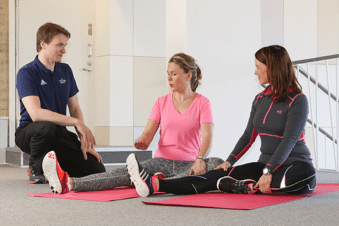
Turmoil © lynette sheppard
Mood swings can be some of the most disconcerting aspects of perimenopause and menopause for us and for our loved ones. Thankfully, Harper Reid shares some helpful ideas for ameliorating emotional lability.
How to Cope with Mood Swings during Menopause by Harper Reid

Photo Credit: Pixabay under CC0 Creative Commons License
Perimenopausal women and those who have reached menopause can experience a wide variety of different symptoms which can be attributed to hormonal imbalance caused by the changes taking place in their bodies. Mood swings are very common, although many women may not attribute them to the menopause. This can cause them additional worry and lack of confidence. Those who seek medical treatment are often prescribed antidepressants or hormone replacement drugs, while many suffer in silence. However, maintaining a healthy diet, participating in regular exercise and ensuring sufficient and good-quality sleep can help to control mood swings naturally.

Photo Credit: Pixabay under CC0 Creative Commons License
Exercise helps to lift the mood, raise energy levels and promote sleep. Endorphins are neurotransmitters which are released with regular exercise and which help to make you feel more positive. Aerobic exercise stimulates the blood flow, so increasing the oxygen supply to the brain and helping to clear your thoughts. Also, people who are physically fit are less likely to act negatively to stress. It doesn’t matter what kind of exercise you do, but you must do it regularly. To experience the benefits on mood swings through exercise you must exert yourself at three or four times a week, and preferably daily. Whether you decide to join a gym, invest in some home gym equipment, take up a sport, or get a dog, increasing your exercise time will have multiple benefits. Additionally, including a regular yoga routine into your life can help you to control your body and mind. Set aside a time to do basic breathing and stretching exercise to help create harmony and peace within yourself.

Photo Credit: Pixabay under CC0 Creative Commons License
Diet can improve your mood swings. Eating a well-balanced, varied diet helps to ensure the correct functioning of your body. Studies have revealed that foods that are rich in Omega-3 fatty acids are particularly good for improving mood changes. Magnesium and Vitamin B12 are also vital to raising low moods and regulating the nervous system. The amino acid Tryptophan promotes the production of Serotonin which has a positive effect on mood. Include oily fish, such as salmon, at least twice a week, eat turkey, and increase the amount of eggs, pulses, whole grains, green vegetables, apricots, seeds and nuts in your diet to augment your intake of these beneficial elements. The herb St John’s Wort has been clinically proved to naturally treat depression. Finally, alcohol can improve your mood temporarily, but over a prolonged period, it can actually increase anxiety and depression.

Pexels under CC0 License
Sleep is essential to keep healthy and stay balanced, but many menopausal women have difficulty getting to sleep. Exercise can help you to drop off more easily as you will naturally have used up more energy, and so feel tired. Eating lightly in the evening can help attain you sleep easier. Going to bed with a full stomach can prevent you from sleeping as your digestive system tries to cope with all that food. Try a Camomile tea before retiring to help you on your way to a good night’s rest. Finally, make sure that your bedroom is well ventilated and as dark as possible. Light bedrooms have been proven to make it harder to get to sleep and to maintain a consistent and prolonged period of rest. Consider installing some blackout roller blinds to eliminate as much light as possible. When you sleep in total darkness, your body makes more melatonin. This hormone, which is produced by the pineal gland, helps to regulate our natural sleep-wake cycle. By making your bedroom completely light free with blackout roller blinds, you will be able to achieve sleep faster and enjoy all of the benefits of a full night’s rest.
Harper Reid is a freelance writer from Auckland, New Zealand who has a passion for healthy living and fitness. When she’s not writing, you’ll find her practicing yoga or checking out the latest fitness trends. You can find more of her work on her Tumblr.

